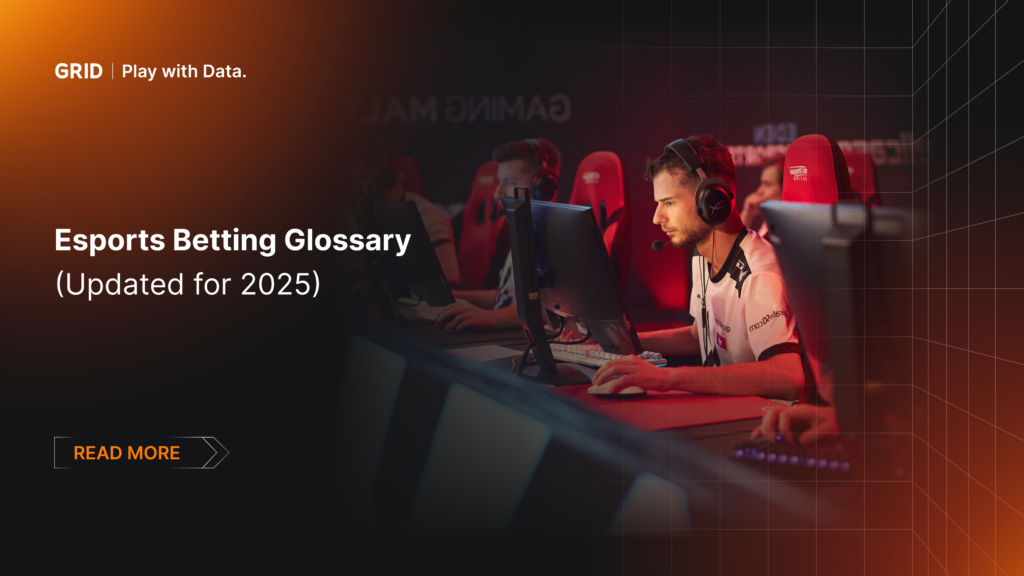The world of esports betting is packed with fast-evolving terminology that can be intimidating to newcomers and even seasoned professionals from traditional sports backgrounds. This glossary is designed to demystify key terms, explain emerging concepts, and serve as a go-to reference for operators, regulators, data providers, and fans alike.
A-C
Bet Builder – A tool allowing bettors to create personalized bets by combining multiple markets within a single match.
Data Provider – A company that supplies real-time match data for odds calculation and market analysis (e.g., GRID).
D-G
Data Scraping – Refers to the methods used to source unofficial data such as OCR, Computer Vision or any other (sometimes manual) transcription of odds or data.
Delayed Esports Data – Live data with a noticeable delay from the action taking place in real time. This can be intentional (imposed by rights holders or distributors) or due to technological limitations.
Esports – Competitive, professionally organized video gaming events featuring teams or individuals in games like CS2, League of Legends, VALORANT, and Dota 2.
Esports Betting – Wagering on the outcome of professional esports matches, tournaments, or in-game events.
Esports Data – In-game data derived from competitive esports matches and competitions.
Esports Data Provider – A company that supplies real-time match data for odds calculation, market analysis, stats, predictions, and official data-powered products (e.g., GRID).
Esports Integrity Commission (ESIC) – A regulatory body focused on anti-corruption and match-fixing within esports.
Esports Predictions – Forecasting in-game outcomes or betting markets using historical data, statistics, and AI-driven models.
Esports Stats – Quantitative information about teams, players, or game performance used in analysis and betting markets.Esports-Specific Betting Markets – Unique bets available only in esports, such as “First Blood” or “Map Winner.”
Fantasy Esports – Formats where users create virtual teams based on real-world performance metrics.
First Blood – A popular betting market referring to the first kill in a match, common in MOBAs like League of Legends and Dota 2.
Game Server – The most reliable source of live esports data, only accessible through direct, official partnership with rights holders or super rights holders.
H–M
In-Play Betting (Live Betting) – Wagering on events occurring during a live match.
In-Game Data – Data sourced directly from the game, referring to actions within the game itself—player position, K/D/A, economy status, etc.
Integrity Protocols – Rules and monitoring systems designed to prevent cheating, match-fixing, and insider betting.
Live Esports Data – Data sourced directly from the game taking place and not subject to any delay compared to real-time.
Map Winner – A common market in esports where bettors predict the winner of a specific map within a best-of series.
Match-Fixing – Illicit manipulation of match outcomes for financial gain.
Micro-Betting – Wagering on small, discrete in-game events.
N–S
Official Esports Data – Data officially sanctioned by the rights holder.
Odds Provider – Firms that set betting odds, for best results, rely on an official data source.
Parlay Bets – A type of accumulator bet where all selected outcomes must be correct for a payout, often offering higher odds.
Pre-Match Betting – Wagering that occurs before a match begins, often using more static, data-derived odds.
Purple Screen of Death – A technical failure in broadcasting or data feeds, typically indicating a critical stream or feed disruption.
Real-Time Esports Data – Immediate, non-delayed data captured directly from live esports gameplay.
Regulated Esports Betting – Betting conducted through government-approved and licensed platforms.
Rights Holder (RH) – The entity holding the in-game data legal rights, usually a game developer or an appointed tournament organizer.
Roster – The list of players who make up a professional esports team for a given competition.
Sanctioned Event – An esports event officially endorsed by a rights holder.
Skin Gambling – Betting with virtual in-game items, typically outside regulated frameworks.
Streaming Feed – The live video broadcast of an esports match, often used for entertainment but not reliable as a data source.
Super Rights Holder – The creator of the in-game data IP—game developer or publisher. They control both the competitions and the game (the sport itself).Synthetic Play / Synthetic Gaming – Staged gaming events designed solely for betting.
T–Z
Trader Portal – A user interface provided to sportsbooks for setting, adjusting, and managing esports betting markets in real time.
Unofficial Data – Data sourced without sanctioned access from the rights holder, typically delayed, less granular, and less reliable.
Unsanctioned Event – Competitions organized without official rights holder endorsement.
Virtual Esports – AI-driven, digitally simulated sports events with outcomes distinct from live competition.
Wagering Handle – The total amount of money accepted in bets by a sportsbook over a given period.
Bookmark this glossary for future reference as the esports betting ecosystem continues to evolve—and follow GRID for more insights, case studies, and data-powered analysis on the future of competitive gaming and betting.


